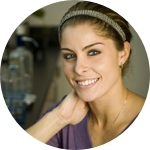About This Project
Protein is often thought to be a workout necessity, the essential complement to every gym bag. Missing protein during the post-workout anabolic window is viewed as unfortunate, if not detrimental to one’s training goals. However, the scientific literature on this subject isn’t quite so black and white. New methods of measuring protein synthesis may challenge the high-protein paradigm among active individuals and athletes, giving rise to a more optimal diet to enhance performance.
Ask the Scientists
Join The DiscussionWhat is the context of this research?
If you ask typical gym-goers how much protein they need each day, chances are you will get a variety of answers. The same goes if you ask when the best time is to take said protein. Apart from media influence, a key reason such confusion exists is that scientific literature has no clear answer to either question. The most widely accepted recommendations for active individuals are that daily protein ingestions should be higher (1.4 grams of protein per kg body weight per day for individuals involved in endurance exercise, and 1.8 g/kg/day for those involved in strength and power training), and that protein should be supplemented immediately after a workout. The reality is that studies have in fact generated a wide range of results from 0.8 to 3 g/kg/day!
What is the significance of this project?
The purpose of this research is to measure muscle metabolic processes using a relatively new but established method of deuterium oxide labeling. These methods will allow determination of how protein can be optimally utilized to improve body composition in individuals who are exercising regularly. It is likely that these new methods will challenge the high-protein paradigm that is currently accepted among active individuals and athletes, giving rise to a more optimal diet to enhance health as well as performance. The results of this study and the validation of these methods in humans will be extremely valuable in future studies examining compromised muscle function such as space flight simulation, AIDS- and cancer-related muscle loss, age-related muscle loss, etc.
What are the goals of the project?
To determine whether protein needs are in fact elevated and whether timing of supplementation affects protein use in muscle, subjects in this study will ingest either low or high daily protein (1 vs. 2 g/kg/day), and they will supplement either immediately or delayed post-exercise (0 vs. 3 hours post-exercise). Ten subjects will serve as baseline controls, exercising and eating as usual. Subjects will complete a 2-week familiarization period to adjust to the prescribed exercise and nutrition protocols, undergo baseline strength, power, and body composition testing, and then complete the 2-week exercise+supplementation period. Muscle biopsies and deuterium tracer administration will occur during the final days to measure muscle metabolism over the entire post-exercise recovery period.
Budget
Subjects must be compensated to encourage adequate enrollment in the study. Subjects will undergo two muscle biopsies, and therefore compensation will be given for each biopsy at a rate of $50 ($100 total).
I have received some funding from the Huffines Institute at Texas A&M ($1500) and from my professor's grant with the American College of Sports Medicine ($1250). These funds have been used to purchase the deuterium tracer needed for labeling proteins. Additionally, analysis of samples will be covered by the Muscle Biology Laboratory at Texas A&M.
Endorsed by
Meet the Team
Team Bio
The principle investigator on this project is Erin Simmons, who has a B.S. and M.S. in Biology and is currently a Ph.D. candidate in the Department of Nutrition and Food Science. Her advising professor, Steven Riechman, Ph.D, is an Associate Professor in the Department of Health and Kinesiology and a member of the Graduate Faculty of Nutrition at Texas A&M. Committee member Jim Fluckey, Ph.D., is a Full Professor in the Department of Health and Kinesiology.
Erin Simmons
My journey into the field of nutrition and exercise physiology has been on a bit of a winding road. I have always loved science from elementary through high school, but when I graduated and headed to Florida State University, I thought I wanted to be a marine biologist. I majored in biology and obtained a certificate in marine biology, while also competing on the Women's Track and Field team. Track and field was my love, and with two years of eligibility left, I stayed at FSU for a Master of Science degree in biology. This degree focused on fish population conservation and used a great deal of math, programming, and ecology to build models that predicted fish population behaviors. I spent my spare time helping biology professors in the field, sampling seagrass beds, tagging sharks, and surveying coastal plant communities. In an interesting turn of events, I was awarded a Navy Research Enterprise Internship with the Experimental Diving Unit after graduation. While I did have a background in SCUBA, the position as a laboratory technician in a physiology lab was quite different from the marine and coastal laboratory where I'd been working the last few years. Little did I know that the exposure I would get to exercise physiology at the Diving Unit would help shape my future. Once my internship was over, I stayed at the Experimental Diving Unit for a while longer as a Department of Defense contractor. It wasn't long before I decided to go back to school for my Ph.D., however, and I ended up at Texas A&M in a doctoral program in Wildlife and Fisheries Science. Used to involvement in athletics, I signed up as a volunteer assistant coach for the Track and Field teams there, working with the jumpers to help run practice and coach during meets. Working with athletes really clicked for me. Two years after my arrival at A&M, I switched my doctoral program to sport nutrition and exercise physiology and I haven't looked back!
Additional Information
This project has been approved by the Texas A&M Institutional Review Board for human subjects research (IRB2016-0376), and the lab also has university approval to conduct blood draws (IBC: 2016-018, 2014-054).
Muscle biopsies will be conducted by Dr. Steven Riechman and Dr. Jim Fluckey, who are approved by the university for this purpose. They have been conducting these biopsies for years with rates of complications below 1%.
Project Backers
- 61Backers
- 108%Funded
- $5,446Total Donations
- $87.84Average Donation

